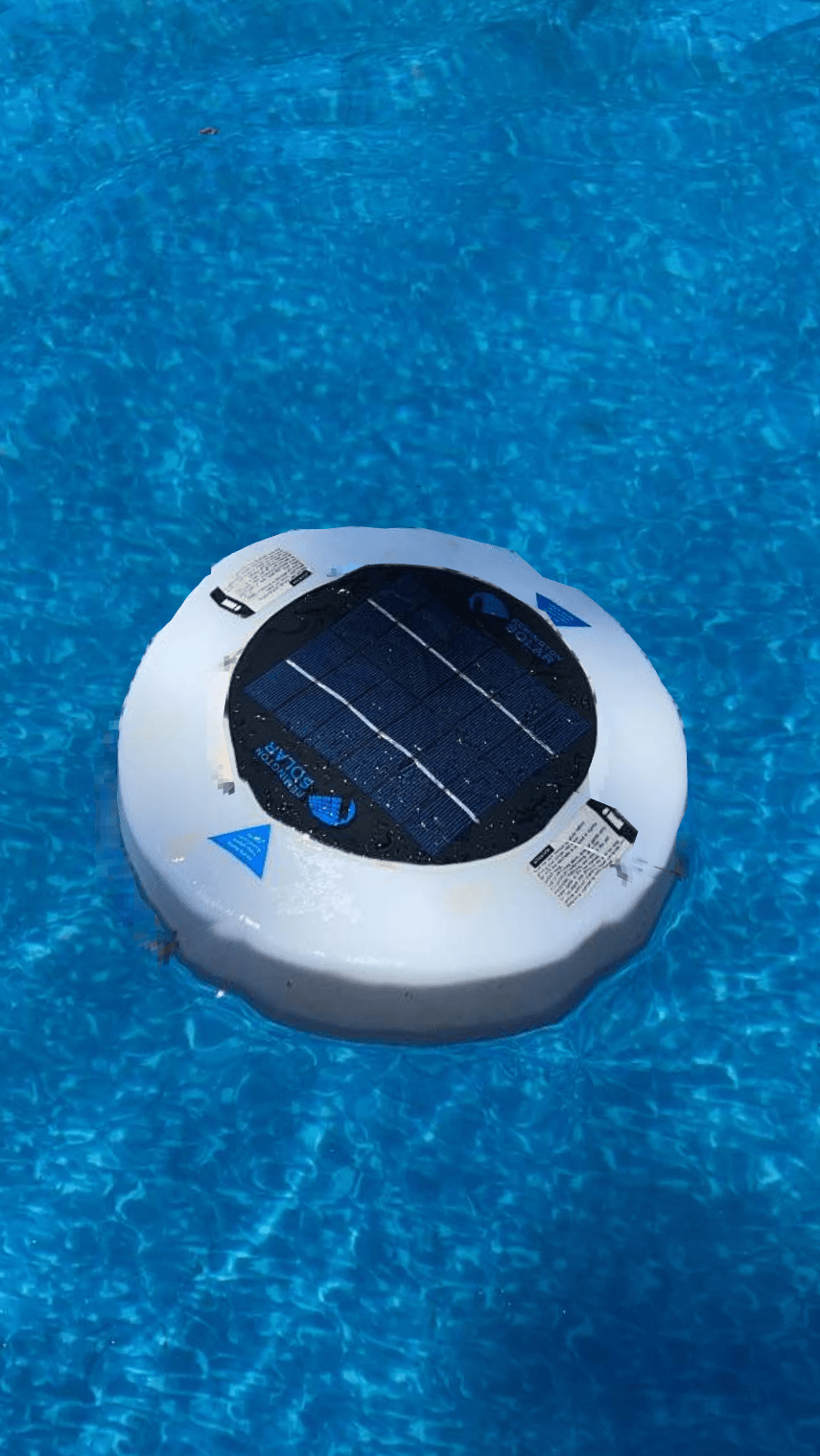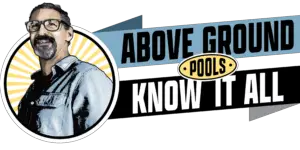Ionizers for above-ground swimming pools have been available for more than twenty years. What is an ionizer and how does it work? And is it worth it?
A (copper) ionizer for an above-ground pool is an add-on for the pool’s equipment and is designed to help kill living things not wanted in the water. The unit releases copper ions into the pool which will kill algae and help sanitize the water. An ionizer can only help sanitize the pool and does not oxidize. This means that a sanitizer/oxidizer like chlorine must also be used with an ionizer.

HOW DOES AN IONIZER WORK? A REGULAR GUY’S EXPLANATION
As long as you aren’t writing a thesis on ionizers or planning on designing your own, you only need a very basic description.
An ionizer for a swimming pool is a tube that is plumbed in line with the equipment. In that tube is a copper block with a wire attached to it. The other end of the wire is attached to an electronic box with a read-out of some kind (the read-out doesn’t matter much).
As the water flows through the tube with the solid copper block in it, a tiny amount of electricity is sent to the copper which releases a tiny amount of copper ions into the pool water.
These copper ions now present in the pool water will kill living things (mainly algae) in the water at contact. The copper ions cannot stay in a killing state for very long, so new ions have to be added constantly.
The solid copper block in the tube will get smaller and smaller as it’s broken down by the electricity to release ions in the water. In a year or two, the copper block will be gone and a new one will have to be added.
This is essentially all an ionizer is. Something that releases copper ions in the water which kill some of the algae.
TWO THINGS HAVE TO HAPPEN TO MAKE SWIMMING POOL WATER HEALTHY
I’ve got some good news for you – You don’t have to be a chemist to properly maintain a swimming pool.
Understanding the two things needed to make a pool healthy will make things much easier for you when chemically maintaining a pool.
The first thing that has to happen is that the living things in the water (like algae) must be killed. Preferably, they should be killed right as they reproduce and grow from the very beginning.
The technical “tree hugger” term for this killing is “sanitizing”.
The second thing that has to happen is the things you killed have to be taken out of the water. And preferably, they should be eliminated as soon as they are killed.
This second thing is the harder part. It’s less understood by most and the reason most have issues with their pool chemistry.
NOTE: Getting rid of what’s been killed is mainly done by chlorine and not the filter. It’s important to know this.
The technical term for getting dead things out of pool water is oxidizing.
IONIZERS WILL DO SOME SANITIZING, BUT CANNOT OXIDIZE
It may be hard for some to conceptualize what has to constantly occur in order to keep a swimming pool clear and healthy. The reality is that you are keeping an area of existence free from living things by continuously killing them and disposing of the bodies.
Ionizers will kill some of the things you want dead in the water, but it won’t help get rid of them.
This is an important consideration as simply killing algae is not even half the job of maintaining a swimming pool. Getting rid of dead algae and other things (oxidizing) is absolutely essential!
For this reason, an ionizer by itself cannot maintain a healthy swimming pool. It must have help with sanitizing (killing) and there must be an oxidizer (cleaner) present.
AN IONIZER CANNOT DO ALL OF THE SANITIZING (KILLING)
You might be reading this and say “OK fine, I’ll use an ionizer to do the killing and something else to do the getting rid of”. Sorry to say that won’t work in almost all swimming pool scenarios.
An ionizer will not be able to keep up with the killing demand in almost all swimming pool applications.
WILL AN IONIZER SAVE ME ON CHLORINE COST?
This will depend on the situation but it’s unlikely that you will save any noticeable amount.
For sixteen years, I owned and operated a swimming pool service company. We would keep records on how much chemicals were used each week for each pool on the routes.
The pools we serviced were mainly ingrounds with all types of add-ons including some with ionizers.
As part of being a profitable business, I kept track of chemical usage and patterns as part of cost analysis. Finding less expensive ways to do weekly maintenance was a part of my bottom line.
During those years of servicing pools, “I found that those on the route with working ionizers did not use less chemicals than those without ionizers”
I’m sure there are some very specific situations where an ionizer will save some money in chemical cost (mainly chlorine), but in my situation, none of them did.
THE BIGGEST REASON ABOVE GROUND POOL OWNERS HAVE IONIZERS
During my 36 years in the above-ground pool business, very few pool owners have decided to get an ionizer. In reality, almost all who have an ionizer were either sold one by the pool retailer or it came with the pool package.
For retailers, selling an ionizer with an above-ground pool package is very profitable. There is a very nice mark-up with most ionizers. This is why you will see them.
What I’m saying here is that anyone who has any real knowledge of maintaining a swimming pool would never recommend an ionizer just for how well they work. They would recommend one though if there were two or three hundred dollars more profit to the pool package though. Jus’ sayin’.
MAINTAINING AN IONIZER FOR AN ABOVE GROUND POOL
Ionizers have a block of solid copper in them. Over time, these copper blocks will get smaller and smaller and will need to be replaced.
The average lifespan of a copper block in an ionizer is one-two seasons.
Replacing the block is usually easy to do. Most of them will require you to take the entire unit off from the pool’s piping, so it’s best to plumb in two quick disconnect fittings on both sides of the unit. This way it will be easy to take it apart for the copper block changeout.
If you don’t have quick disconnects, then you’ll cut the PVC piping to get to the inside of the ionizer unit, then plumb it back inline with two coupling fittings.
Replacing the copper blocks is the only official maintenance with an ionizer, but they do have an electronic portion to them. And when it comes to electronics, they can need fixing at any time.
The electronic part of an ionizer can be simple or complex. In truth, they only really need to turn the electricity on and off, but some will have options to allow more current to run to the copper(which releases more ions into the water per hour), and other options are not needed.
At any time, the electronic part of the unit could break and need replacing, although most will hold up well for at least a few years.
Real-world observation: Most copper blocks in ionizers don’t get replaced. And if malfunctioning, most electronics of ionizers don’t get fixed. Pool owners decide it’s not worth the cost to fix or maintain them.
IONIZERS CAN CAUSE STAINING
During my sixteen years of having a pool service business, I had a few concrete pools that stained severely due to a malfunctioning copper ionizer. This can be a real issue if too much copper is introduced to the pool and it adheres to the walls.
With above-ground pools, this isn’t as much an issue as the metal doesn’t attach to vinyl like it does to a cement finish. Personally, I haven’t seen vinyl liner damage from the copper of an ionizer, but some say it has happened to their pools.
MY OPINION OF IONIZERS FOR SWIMMING POOLS
If you have read the above article, you probably already know my opinion on ionizers. If not, then my opinion is that they are not worth the money. Not at all.
If you are wanting something to add to your above-ground pool’s equipment to make it easier to maintain, then I recommend a salt-chlorine generator instead.
